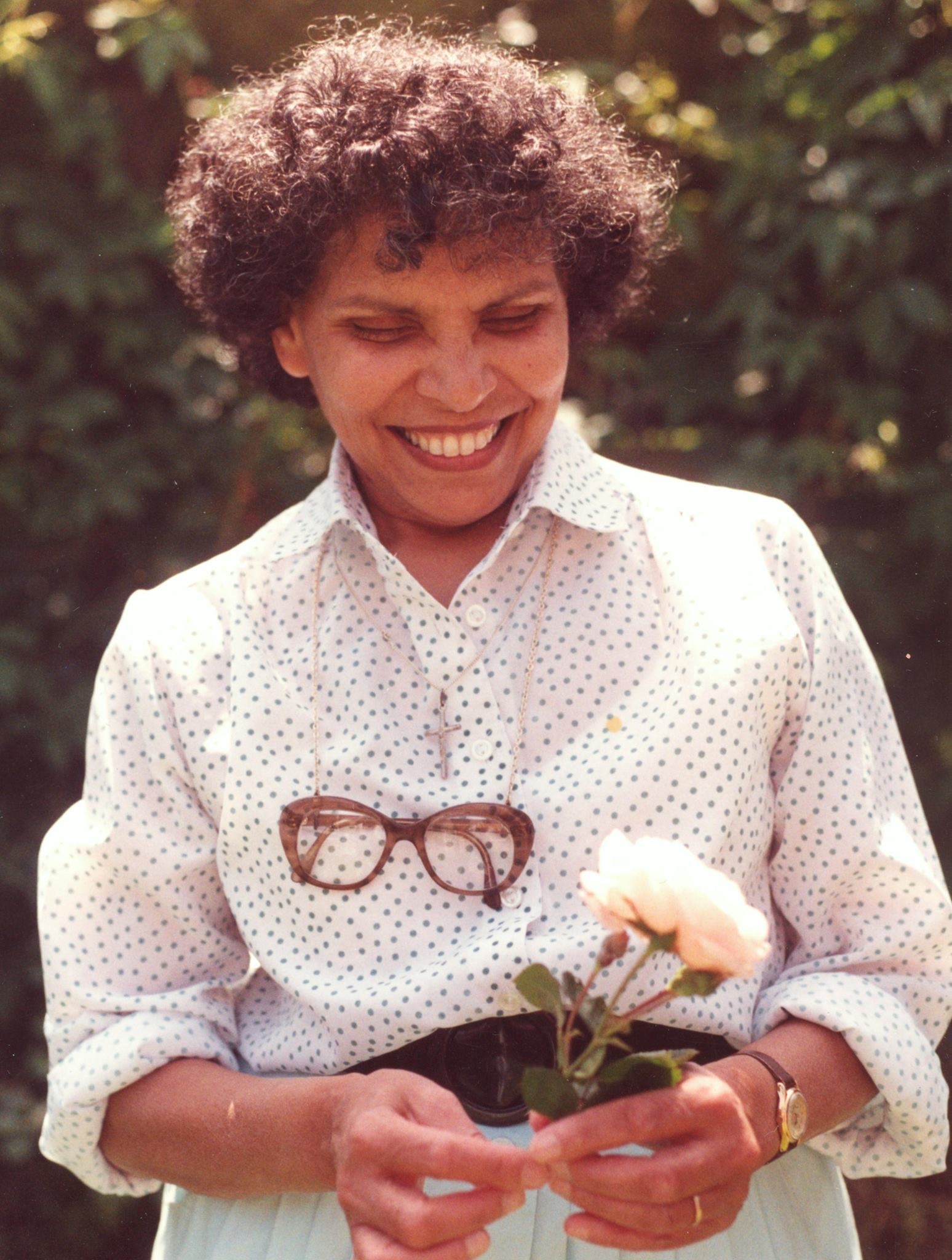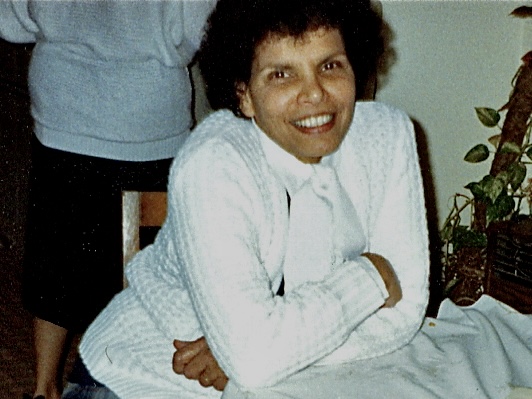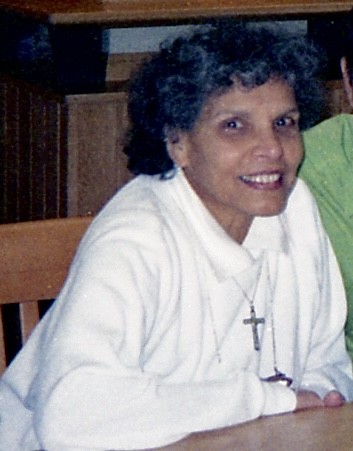
Iris’s Story
written by Graham, Iris's son
Read Iris's story as told by her son
The only thing that defeated her was her cancer, but even then, her passion and dedication to the Hospice gave her something back, which was dignity in death, surrounded by people that loved and cared for her.
Graham
Iris was a fascinating woman, she was born in Bombay in 1929 to a large Indian Anglo family, one of 17 people in her family. She was a devout Catholic and her religion was really important to her. She moved to London, Great Britain when she was nine, and her religion stayed with her throughout her life.
She moved to Basingstoke in 1964, with our family, which at the time was a family of 12, which grew with two further children when we came to Basingstoke. It was very tough for her, partly due to overt racism that we all suffered, but also, because we were poor. However, it didn’t stop her – throughout her whole life, mum would be raising money for a charity or another, normally through her beloved church, St. Joseph’s (holy Joe’s as we called it).
She was very active in her church community and went every day without fail. The only time she didn’t go was when she was admitted to the Hospice, but even then her priest came to her every day, which was brilliant and I think says a lot about the Church and the Hospice.
She was a very passionate person, she came from a very affluent family in India, which was a complete antithesis to what she experienced in the UK. But she never forgot the poverty she witnessed in India, which is one reason she never returned, she found it distressing even speaking about it. But throughout her life, she would give and raise money for causes in India, one of which built a school called St. Anthony’s.
At St. Joseph’s she ran the mission shop, where she convinced people to donate things, such as a tie from Prince Charles, a hilarious letter from John Cleese and various other thing from dignitaries up and down the country. She had these items auctioned off to raise money for various charities, including the hospice group.
Once she had an idea, nothing (no matter how irritating it was to those around her) could stop her – and very few things did.

She was a great believer in social justice, she was an amazing woman. Tremendously passionate and tremendously irritating because she would just drag you in with whatever she was doing. That was Iris Wilkin, and we as a family are immensely proud of her.
The Hospice was not her first project, but I think it was certainly the one she was most passionate about. She did a huge amount of research into the Hospice movement. She did a huge amount of fundraising for the Hospice locally and she sat on the committee.
She was a part of the whole process, right from the very beginning. She even went out and canvassed throughout Basingstoke to raise awareness. Because, back in the late 70s, early 80s, many people had not even heard of the Hospice movement. It was something she worked to challenge and change.
Mum really resonated with Mother Theresa, and essentially giving dignity in death. So, when she understood about the Hospice movement and understood about it giving dignity in death as well as life, it became really important to her.

Mum was diagnosed with breast cancer in 2002, ten years after she had helped to open the Hospice, and soon she was referred to it for palliative care. There was a huge irony in mum coming to the Hospice, as she really didn’t want to come. She was petrified of the idea, and she asked to speak with me, as I was a nurse. We were very close, and she wanted some counselling about what she should do. I offered to bring her here to look around the Hospice, and I said if she didn’t like it then I would bring her home. But I knew it was the right place.
The thing with mum is that you could read her immediately, if she was angry, you knew – everyone knew! But similarly, if she was happy or relaxed you could see that too. When we came to the Hospice it was instant, I knew and she knew this was the place she should be. I think I would have found it difficult to find a better place for her.
It was a terribly difficult time, she was the matriarch of the family, and she was hugely respected by all of us, as well as the people in her church community and beyond. She was only 72 at the time, which is no age. But to know she was here – with the environment and people, who are just magnificent, it was a huge reassurance. For her to end her life with dignity, which she did.
I remember mum’s last day, the whole family were here. She wanted the whole family around her. We had all gathered in the garden – it was a beautiful, late summer’s day. The staffing couldn’t have been nicer.
If I’m honest I was blown away, I didn’t know what to expect after 23 years, it has changed a lot, and I find it humbling walking around and seeing what has happened in such a positive and thoughtful way, from the care and how the money has been spent – it is extraordinary.
It was wonderful then and in my career, I have worked for the NHS, local authorities and hospices for over 45 years. But this is by far this is the nicest environment, and it’s more than just the environment, it’s the people and sense of calmness and care. I get that same sense and feeling coming back now – and that feeling is not something you can fake.
Hospice at Home was not a thing at the time but I am thrilled that it is now, along with recognising the role and supporting carers, is really important and something she would be looking down on and saying: brilliant!
If mum was to come back now, she would be absolutely thrilled, as I am, as I know my family would be. And if mum needed Hospice care now, I couldn’t think of a better place. It would have been difficult for me at the time to think of a better place than she was – but you’ve made it even better, and I find that extraordinary.
She was very proud that the Hospice happened. She was very focused on the Hospice in the last ten years of her life. That passion never waned, and even when she died, she didn’t want flowers – she wanted donations for the Hospice.
St. Michael’s was not created because of mum, but she played an integral part of it. I think that it’s a legacy that mum and the people of Basingstoke as a whole should be hugely proud of.
Being part of a community that was not particularly welcoming of her or the family, never stopped mum. One thing she taught us, and she taught us a lot, was: ‘not all giants are big’ and she was a giant of a woman, all 4 foot 5 (she would say 4 foot 6).
Out of a family of 12 we have three nurses, a social worker (me) and the vast majority working for local and health care services, there is no question on the impact mum had on us all. She gave us a set of values that has guided all of us in our careers and lives for the better.
The only thing that defeated her was her cancer, but even then, her passion and dedication to the Hospice gave her something back, which was dignity in death, surrounded by people that loved and cared for her.
So, to go around and see that it is not only still happening but even better – from what I’ve seen, its beyond care its love.
